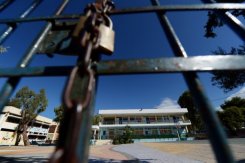Greece's fragile balance 'may be overturned'
(MENAFN- AFP) Greece is not out of the woods yet and the fragile balance created as the coalition government tries to implement reforms to tackle the economic crisis could easily be overturned, experts say.
"When we are dealing with such a crisis, which is the most serious crisis Greece has experienced since WWII, any sort of accident... could prove fatal for society and institutions," former minister of the interior Prokopis Pavlopoulos told AFP.
Currently a lawmaker in Prime Minister Antonis Samaras's conservative New Democracy party, Pavlopoulos was interior minister during the riots that shook Athens in December 2008, sparked by the death of a 15-year-old student killed by police.
"Political and social conditions remain very fragile," Pavlopoulos said.
This week, thousands of state workers are on strike protesting an overhaul of the public sector, part of the austerity programme imposed by Greece's so-called troika of EU, International Monetary Fund and European Central Bank creditors.
Public sector unions have called demonstrations around the country on Wednesday.
Hard hit by the economic crisis, Greece is experiencing a sixth year of continuous recession and has a staggering 27-percent unemployment rate.
Meanwhile, Greece's conservative-socialist coalition government is "squeezed" between radical leftists Syriza and neo-Nazists Golden Dawn, says a lawmaker of socialist party Pasok who chose to remain anonymous.
Golden Dawn, which ranks as the third most popular party according to polls, "is eating away voters from New Democracy," added the same deputy.
The coalition currently has a very narrow five-seat majority in parliament.
According to the same deputy, Samaras' criticism of political extremes earlier this week was an effort to restrain his party's overtures to the neo-Nazi party.
It will take many months for the public to appreciate the benefits from his government's austerity policies, Samaras said.
That is why the next few months are "the most crucial politically," he said, further describing this transitional period as very appealing "to extremists."
"This gives one last chance to populists and extremists to attempt to derail all progress we have made," he added.
"Social conditions remain very fragile, the political scene slightly less so," said analyst Ilias Nikolakopoulos from the Opinion Institute.
"The government will do its best to stay in power until the municipal and European elections in the spring, but an accident could occur any time," he says.
"It could be anything. It could be a fatality during a demonstration, caused by police intervention. Or some desperate person setting themselves to fire," he adds.
"The President (Carolos Papoulias), who is 85 years old, could well face health problems and since there is no parliamentary majority to elect another president, that would lead to elections... Of course, I do not wish for this to happen! But anything is possible," he adds.
In Greece, the president of the republic is elected by the parliament's 300 lawmakers and a minimum 180-seat majority is required.
"For the time being, we are in a highly unstable balance, but it is a balance all the samem" said Nikolakopoulos.

Legal Disclaimer:
MENAFN provides the
information “as is” without warranty of any kind. We do not accept
any responsibility or liability for the accuracy, content, images,
videos, licenses, completeness, legality, or reliability of the information
contained in this article. If you have any complaints or copyright
issues related to this article, kindly contact the provider above.
Most popular stories
Market Research

- Yield Basis Nears Mainnet Launch As Curve DAO Votes On Crvusd Proposal
- Dupoin Reports Global Growth, Regulatory Coverage, And User Experience Insights
- Betfury Is At SBC Summit Lisbon 2025: Affiliate Growth In Focus
- Stonehaven Circle Marks 13Th Anniversary With Hadrian Colwyn Leading Calvio Ailegacyx Innovation
- Edgen And Sahara AI Announce Strategic Collaboration To Pioneer Decentralized Validation In Market Intelligence
- Hola Prime Expands Its Platform Ecosystem With Next-Gen Tradelocker






















Comments
No comment